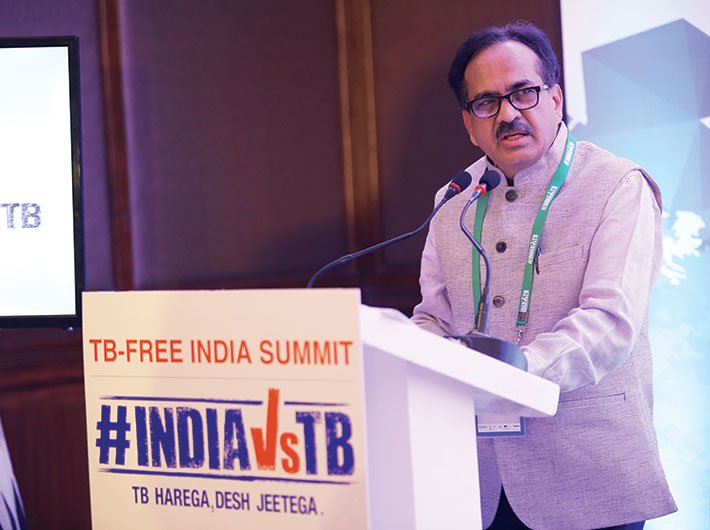Close to 1,400 lives are lost to tuberculosis every day in India. The government has set itself the target of making India TB-free by 2025, under ‘National Strategic Plan for Tuberculosis Elimination 2017-25’. This would involve providing not just medicine to the needy, but also money so that they can buy nutritional food – a must in the treatment. The health ministry now plans to deploy the Aadhaar-linked direct benefit transfer (DBT) to reach out to the genuine patients and avoid ghost beneficiaries. Under the Revised National TB Control Programme (RNTCP), monetary benefits to tribal patients and health workers who notify TB cases will be paid through DBT now. It has asked the state to give top priority to updating Aadhaar numbers and bank account details of all TB patients and care providers so that the DBT mode can be rolled out before the 2025 plan comes into force. Governance Now talks to deputy director general (tuberculosis) Dr Sunil D Khaparde on the benefits of DBT in TB treatment.
How will Aadhaar and direct benefit transfer (DBT) help TB patients?
DBT is an ambitious plan of the prime minister. In tribal areas, under the existing TB programme an incentive of Rs 750 is already being given to TB patients and Rs 250 to service providers for notification and Rs 500 for follow-up. The money is given through cheques. DBT in the TB programme will help directly transfer the money in the bank accounts of service providers and patients.
For this Aadhaar is mandatory to identify the person and avoid duplication of beneficiaries. RNTCP has developed a mechanism called Nikshay (an internet-based monitoring mechanism) where all cases are registered and notified. The DBT will be given to those linked to Nikshay. This DBT mechanism is needed before we implement the National Strategic Plan for Tuberculosis Elimination 2017-25 which proposes more funding and newer initiatives for TB patients. The plan is to provide money to not only tribals but all poor TB patients. The amount is wage loss compensation and a support system to provide nutritious food.
Several NGOs working in tribal areas of Chhattisgarh and Madhya Pradesh told us that they were not aware of tribal TB patients getting any monetary help, though service providers do get it. Why so?
It is not popularised by states. Schemes are there but after all the money has to be utilised by the state government. Some states have used it and some have not. Also Rs 750 for the entire treatment is a small amount.
There are certain states which are already running their own TB programmes. Will DBT apply to those schemes too?
We have developed the mechanism. Some trials and pilot projects have already been conducted. If we link beneficiaries’ Aadhaar with Nikshay, patients can be very well identified. There will be no duplication of services. The centre is just proposing to give Rs 500 per patient per month under the strategic plan to compensate wage loss and give nutritional food support. We can give medicine but we cannot ensure their nutrition. That is not the doctor’s or health ministry’s task. Therefore, we are even thinking of linking the scheme with PDS [public distribution system]. We are also looking at other platforms like anganwadis to help TB patients in getting nutritional food. TB is not just a health problem but also a social problem. If we really want to eliminate TB we need inter-sectoral coordination.
What happens if a TB patient with the Aadhaar card is not registered in Nikshay? Is there any mechanism to check that no TB patient is left out in this process?
Once a case is registered with Nikshay, it means the government is notified about the patient. It is the responsibility of our district level officer or private clinic/hospital to ensure that details of all TB patients are fed properly in Nikshay. In government hospitals the list is with the district officer and they are already notifying to Nikshay. Today, 70 lakh cases are on the portal. We are also doing active case finding and notifying them. It is an important aspect because only then we can take proper actions. After notification, the next step is verification. From public hospitals there is 95 percent reporting.
As for private hospitals, there are complaints of under-reporting.
Since ages we have been asking private hospitals for proper notification of TB patients. They should directly feed the data on Nikshay or can provide the information to the nodal officer. The private sector is the main pillar of the strategic plan. Without its support we cannot control or eliminate TB. Only 15 percent cases are reported by the private sector and about 60 percent patients are going to them. We want to reduce this gap. But we know the progress will be slow. In 2014-15 only one to two percent cases were reported by private hospitals; now the number has reached 15 percent. During the last three-four years we have done various pilots in Mumbai and Mehsana [Gujarat]. We have developed a strategy to give free TB diagnostics and drugs to the private sector. Through this they can align with the government programme.
How is the health ministry trying to bring private players on board?
If we are giving free drugs to the hospital, we want them to notify new patients to us. Currently, we are just convincing the doctor to notify us for the interest of the nation. It will take time. If they don’t, strict laws should be made that ensure mandate notification and punitive action against defaulters. Only after penalties are imposed in one or two cases can we expect changes. We are trying to convince them and sensitising them about treatment protocols through IMA and other interface agencies.
In the strategy plan we are looking at developing some interface agencies between the government, community and private sector. They will help ensure that already notified patient should get free drugs and diagnostics.
The Bhore committee report of 1946 outlined two major fronts on which TB needs to be fought – the socio-economic domain of Indian life and direct attack on the disease through medicines. Where do we stand now?
We have factored in all this in the strategic plan. A concerted effort is required from everyone. It is not the sole responsibility of the government. The government can act as an enabler, create an environment. In the SDG Goals 2030 health is just a small part. There are bigger goals like hunger, food, agriculture, gender and education which will have an impact on overall health. TB is driven by poverty. With growth and development, TB will decline. It was once rampant in Europe but as its economy improved, the incidence came down.
[email protected]
(The interview appears in the January 15, 2018 issue)



